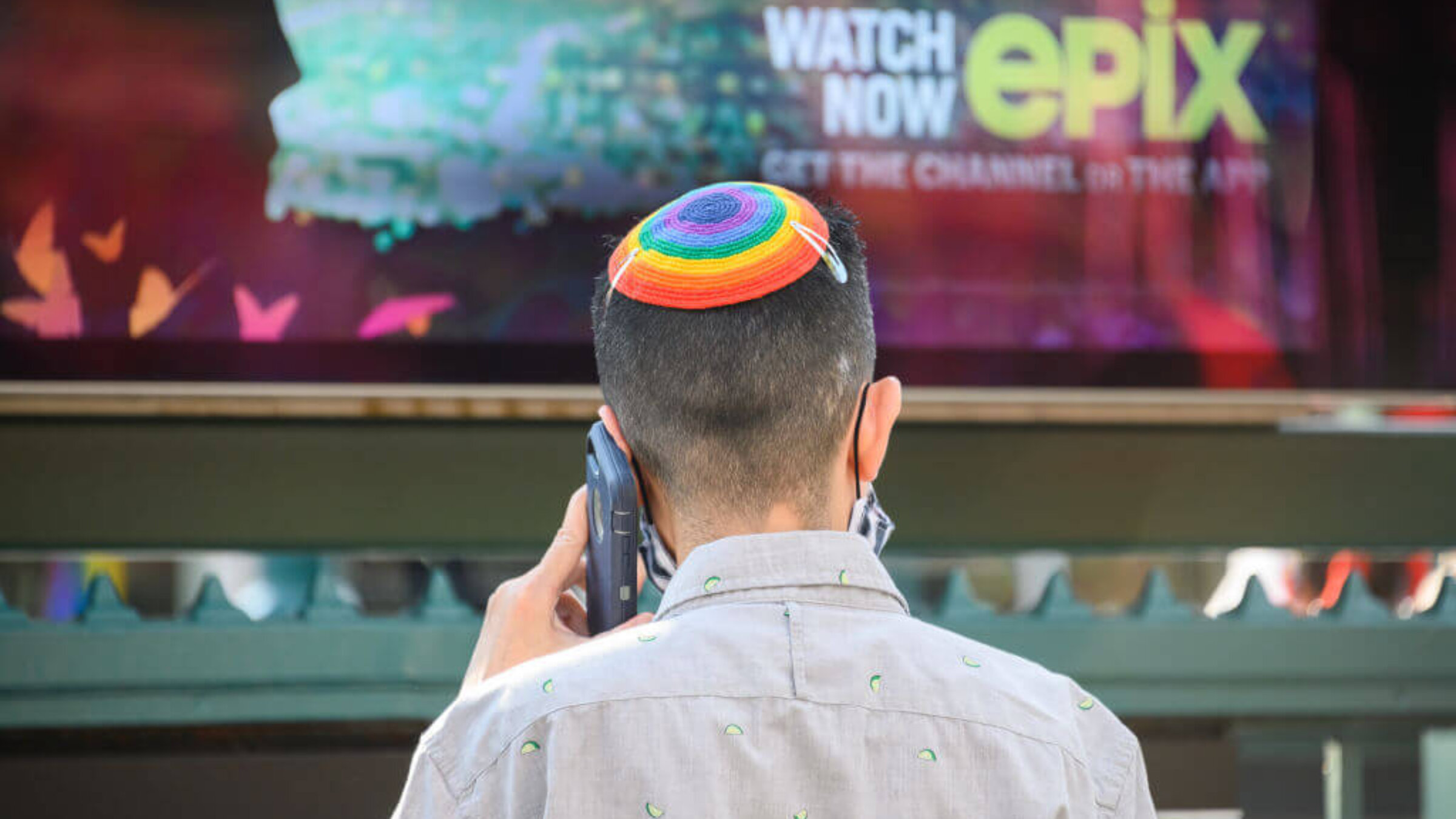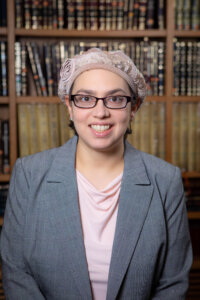I’m an Orthodox parent of a non-binary child. I am confident Jewish law can accommodate LGBTQ Jews
Rabbis have a halachic responsibility to consider the human dignity of the individuals affected by their rulings

A person wears a pride-themed yarmulke in the West Village on June 26, 2020 in New York City. Photo by Noam Galai/Getty Images
“If you don’t like it, leave.”
Anyone who has ever advocated for change in a traditional community has probably heard a variation of this dismissal. As a lifelong Orthodox Jew, I have — infrequently but memorably — heard this any time I have suggested small changes to customs that are permitted by Jewish law.
Though I have long felt that LGBTQ Jews should be welcomed with open arms in Orthodox synagogues, the issue became personal in my life when my 11-year-old child shared with us last spring that they identify as non-binary. My husband and I always knew that our love for our child was unconditional. Yet in the months before they came out publicly, we worried that there might be people in our Orthodox circles who would not understand or accept them.
Though it took some time for our child to be willing to share their gender identity with our Orthodox family and shul, we needn’t have worried — our family and our Orthodox community have fundamentally accepted our child. While there are certainly challenges that present themselves in the Orthodox world because it is organized around the gender binary, everyone has treated them with thoughtfulness and sensitivity.
That is why I read with dismay about a trans woman, Talia Avrahami, being told by the rabbi of her New York shul that she could not sit in the section that corresponds to her gender identity, effectively ejecting her from the community. News reports suggest that the rabbi felt his hands were tied and no other decision could be made. This represents a fundamental failure of the system of psak (legal rulings relied upon by Orthodox Jews) to accommodate the LGBTQ members of our community.
Orthodox Judaism has at its core the principle that Torah relates to every part of our lives. There is no area of our lives that is not touched by halacha, nor is there a challenge that the halachic system cannot meet. If there are Jews committed to living a life guided by halacha, there must exist a way for the halachic system to help them navigate their life regardless of their gender identity.
Some people choose a shul for its kids’ programming or the social opportunities or the quality of its kiddush. No one interrogates those choices if the person doing the choosing conforms to the norms of the community. By all accounts, Avrahami was an active member of her synagogue and lived according to the Jewish halachic and cultural expectations of her Orthodox community. Yet despite her observant lifestyle, Avrahami is far from the first member of the LGBTQ community that has had to justify their desire to be welcomed and accommodated in Orthodox shuls.
I have been a Jewish day school teacher for nearly two decades. Even before my child came out, as we emerged from pandemic lockdowns, more and more students shared their true gender identities. It was not that the number of students in my orbit who were gender non-conforming had drastically skyrocketed, but simply their readiness to be seen by their community as their authentic selves. It was incumbent on us to see them, and to change our environments in response.
In the pluralistic setting where I currently teach, adjusting our environments is simpler because the gender binary is not a part of everything we do. Orthodox schools, like the one where I spent my first decade of teaching, clearly face greater challenges. Our Orthodox rabbis and leaders should not reflexively imagine, however, that these challenges necessitate LGBTQ students going elsewhere.
The Talmud in Brachot 19b tells us, “Great is human dignity, as it overrides a prohibition in the Torah.” But which prohibition does it override? The rabbis of the Talmud eventually interpreted this statement to refer to the prohibition of disregarding rabbinic law. However, it must be used sparingly. The medieval commentator Rashi gives an example from the Talmud in Shabbat: There, the rabbis override the laws of muktzah (carrying certain items) on Shabbat so that people can carry rocks to be used as ancient toilet paper. Which bathroom to use might be the most controversial part of life for trans and gender non-conforming people in our era; it is instructive to realize that the ancient rabbis recognized bathroom use was a core part of human dignity and that halacha needed to accommodate it.
Psakim are needed because life is complicated. A rabbi must truly understand the people involved — as well as master the relevant texts — before making a decision of such great import.
The relevant texts can be read in different ways in the case of transgender Jews. Most notably, the late Rabbi Eliezer Waldenberg ruled that a trans woman who had undergone gender confirmation surgery was a Jewish woman according to halacha. Any rabbi looking to answer this question for their community would need to read the same sources on the subject, including Rabbi Waldenberg, in order to give a completely sourced ruling. In considering the sources, they weigh the humanity of the people whose fate they consider, and the rabbi is not doing their job properly unless they truly think about how individuals will be impacted by this psak.
The very first chapter of the very first book of the Torah tells us everything we need to know about the guiding principles of our faith: “God created humankind in the divine image, creating it in the image of God” (Genesis 1:27). When rabbis are faced with trans or gender-nonconforming people, they must see the image of God inherent in these people and make rulings that can include them in our communities.
My child’s coming out has been met with an outpouring of love from everyone in their life. But as a parent, I nonetheless hide the newspaper from my child when the cover blares yet another article about lawmakers in nearby states looking to limit the rights of trans youth.
I have attempted to imagine what might happen if we faced the situation the Avrahami family faced, and I simply cannot: Where would we be without the school where my children have thrived, the community that celebrated our child’s simchat mitzvah (coming of age), and the teaching job that fulfills me and gives me purpose?
Jewish educators and rabbis need to look around our spaces and ask the question, “Would a child feel comfortable coming out to us?” Building that trust in advance — even before any kids have come out as LGBTQ — is the job of all of us who are entrusted with the well-being of these children.
The Talmud allows rabbis in certain contexts to make decisions that uphold human dignity. When we truly see our LGBTQ community members as not just neighbors but as our siblings and our children, when we grasp the divinity inside of each and every one of them, only then can we make halachic decisions that truly walk in the ways of the Lord.
To contact the author, email [email protected]
A message from our Publisher & CEO Rachel Fishman Feddersen

I hope you appreciated this article. Before you go, I’d like to ask you to please support the Forward’s award-winning, nonprofit journalism so that we can be prepared for whatever news 2025 brings.
At a time when other newsrooms are closing or cutting back, the Forward has removed its paywall and invested additional resources to report on the ground from Israel and around the U.S. on the impact of the war, rising antisemitism and polarized discourse.
Readers like you make it all possible. Support our work by becoming a Forward Member and connect with our journalism and your community.
— Rachel Fishman Feddersen, Publisher and CEO






























